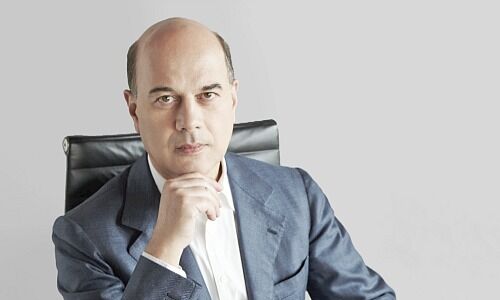Luqman Arnold no longer is in finance. The former head of UBS tells finews.com what he thought of the merger rumors with Credit Suisse and the effect that the pandemic has on banking.
The voice is being drowned out by dogs’ barking – an outrageous behavior, Luqman Arnold agrees. Of course, this is mock-anger only. Who would want to complain in earnest when a dog won’t budge from your side?
Certainly not this banking professional of Indian-British descent, who had taken charge of Switzerland’s largest bank in 2001 for a few months and who had been badly hit by the financial crisis in 2008.
State of Emergency
The world again is in crisis and this time round, 70-year-old Arnold, his family and his three dogs are at home in Thailand. He is stuck in Bangkok, where he lives with his wife. There, the travel restrictions and health risks are exacerbated by a state of emergency imposed by the government following persistent protests against the monarchy.
Arnold seems unruffled. «The Thai are a lovely people and I feel perfectly safe,» he told finews.com in an interview. A younger generation presses for more democratic rights, which seems perfectly reasonable, he says. The ex-banker retired to the Southeast Asian country to focus on his latest project, which is writing a book.
More Labor Than Art
Arnold, known for a thoughtful, contemplative demeanor says that writing a book is more labor than art: «I find it incredibly hard to do, it’s much more difficult than the merger between UBS/SBG!» Arnold was involved on the Asian side of the merger of what was to become UBS and to this day is listening carefully when there is speculation on potential mergers involving the banking giant.
As was the case in recent weeks, when rumors emerged that UBS and archrival Credit Suisse planned to go together – until UBS Chairman Axel Weber stepped in and effectively put a end to the discussion – finews.com reported on the rumors.
The Rules Change With Every Merger
Arnold is taking a skeptical view. He says that big banks had become so complex that virtually no outsider could judge what’s going on inside. «And with every merger, the rules change again – sometimes that is an incentive to merge!»
Culture is a very important factor in any merger, Arnold stressed in the interview, adding that the culture was very different between UBS and CS. Furthermore, in Switzerland the nation would have a right of say, as its two banking giants would be involved.
Analysts Were Shaking Their Fists
Talking about today’s speculation, Arnold is also looking back to the times when UBS was formed. Having been transferred to Zurich after the merger, it became part of his job to keep analysts happy. «But they quickly realized that nearly all the promises made by the bank concerning the merger would be broken – I had analysts literally shaking their fists in the audience.»
At the time, Arnold was quickly emerging as a star on Zurich’s financial market. In 2001, he fell out with the chairman at the time, Marcel Ospel, and left the company after only eight months as its top executive. His successor was Peter Wuffli, who, in 2007, departed shortly before the outbreak of the financial crisis.
The Disappearance of Shares
UBS came to influence his life again during the financial crisis. In 2008, Olivant, an investment firm he had co-founded in London, took an heavy interest in UBS, having acquired a stake worth 1.5 billion Swiss francs ($1.65 billion) in the bank. Olivant wanted UBS to divest the investment bank, which at the time was a powerful division at the ailing giant.
Arnold’s company however had given the UBS shares as security for a loan to Lehman Brothers. That proved a fatal decision, because when the bank collapsed during the crisis, the Olivant stake in UBS seemed to have disappeared – something unheard of in finance. One partner at Arnold’s firm, Kirk Stephenson, took his life.
«This Will Stop Now»
- Page 1 of 2
- Next >>






























